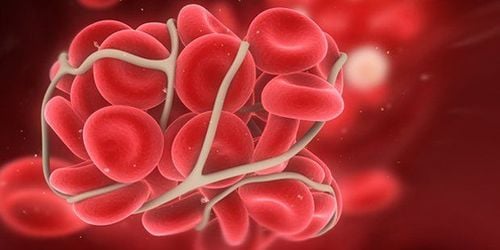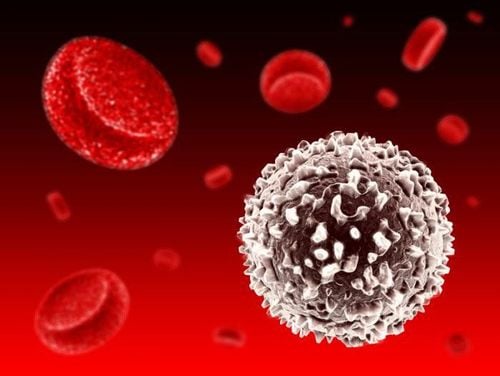This is an automatically translated article.
The article is professionally consulted by Master, Doctor Hoang Thi Hoa - Cardiologist - Department of Medical Examination and Internal Medicine - Vinmec Ha Long International General Hospital.Disseminated intravascular coagulation causes multiple thrombus formation and leads to intravascular clot formation, which progresses to excessive bleeding. Disseminated coagulation is very serious and can lead to death.
1. Coagulation scattered in the blood vessels
Disseminated intravascular coagulation is a pathological state that occurs due to excessive formation of intravascular thrombus and gradually leads to blood clots, accompanied by fibrinogen or fibrin changes in the microcirculation.In terms of blood biology, this is consumptive coagulation, which means that coagulation factors are absorbed and used up in the formation of thrombin and fibrin in the presence of blood clots in the blood vessel. Clinically, it is the phenomenon of bleeding due to coagulation, which means that there are two manifestations at the same time: bleeding syndrome and coagulopathy syndrome.
Disseminated intravascular coagulation is a serious condition that, if the patient has bleeding that cannot be stopped, can lead to death.

Đông máu rải rác trong lòng mạch là một trạng thái bệnh lý xảy ra do hình thành quá nhiều huyết khối trong lòng mạch và dần dẫn đến cục máu đông
2. Causes of disseminated intravascular coagulation
The normal blood clotting process uses proteins, which when overactive can cause disseminated intravascular coagulation syndrome. Causes of disseminated intravascular coagulation syndrome include:2.1 Obstetric causes Stillbirth, eclampsia and toxemia of pregnancy, massive bleeding after placental abruption, pregnancy-induced pyelonephritis, pregnancy, infection during abortion, embolism due to amniotic fluid, placenta previa, uterine rupture,...
2.2 Surgical causes Bleeding shock, traumatic shock, severe burns, burial syndrome, weeks Extracorporeal surgery, porto-aortic anastomosis, cardiovascular, pulmonary, thoracic surgery, prostate surgery, organ transplantation (kidney, heart, liver), large tumor resection and lymph node dissection.
2.3 Medical causes Severe infections, bacteremia. Causes can be caused by staphylococcus, meningococcal, especially gram-negative bacilli, anaerobic bacteria,... Severe viral infection with septic shock, tuberculosis, plague, malignant malaria, internal fungal infection heavy organs. Anaphylaxis, shock caused by intravenous administration of high-molecular-weight iodinated contrast agents, dextran, especially in patients with acute renal failure, acute liver failure, acute pancreatitis, cirrhosis, severe pulmonary embolism, etc. Or people who have been bitten by venomous snakes, heatstroke, severe heatstroke, organophosphate poisoning, threatened aortic aneurysms,...
3. Symptoms of disseminated intravascular coagulation

Dễ bầm tím là một trong những triệu chứng điển hình của đông máu rải rác
Some recognizable clinical symptoms of disseminated intravascular coagulation such as:
Clot formation Easy bruising Red dots on skin surface Low blood pressure Vaginal bleeding Rectal bleeding Non-bloody coagulation, massive and scattered flow, often occurs at the site of collision, injection, surgery, internal bleeding, menorrhagia, ... Shock is often seen in the form of hypovolemic shock, difficult to recover. Manifestations of organ damage due to anemia, organ necrosis, ... in patients with acute kidney failure, heart failure, acute liver failure,... In cancer patients, intracardiac coagulation syndrome The vasoconstriction is usually gradual and is commonly associated with venous coagulation.
In addition, some subclinical symptoms include:
Elastography of blood clots shows signs of decreased coagulation. Decreased platelets. Red blood cells break into small pieces. Decreased plasma fibrinogen. Reduce factors II, V, VIII, XIII, ... Reduce prothrombin < 50%. Howell time is normal or slightly long. May reduce thrombin III resistance. In the presence of soluble fibrinogen monomers, fibrin is detected by the ethanol test. Presence of D dimer due to degradation of fibrin – Test Von Kaulla (-).
4. Treatment of disseminated intravascular coagulation syndrome

Trong quá trình điều trị, bác sĩ có thể chỉ định thuốc chống đông máu.
People with acute disseminated intravascular coagulation syndrome require hospitalization, usually in an intensive care unit for overcome the problem of scattered coagulation while maintaining organ function. The patient will need a blood transfusion to replace the missing platelets. Plasma transfusion has the ability to replace the clotting factors that the patient is lacking.
Disseminated intravascular coagulation syndrome can cause dangerous complications if not treated properly. Complications can occur in the early stages of the disease, and the absence of clotting factors in the later stages. Complications such as blood clots causing a lack of oxygen to the limbs and organs, stroke, and even excessive bleeding can lead to death.
Disseminated intravascular coagulation causes multiple thrombus formation and leads to intravascular clot formation, which progresses to excessive bleeding. Disseminated blood clots are very serious if not treated properly and cause dangerous complications such as organ necrosis, stroke and can lead to death if the bleeding is excessive. Therefore, when you see abnormal signs such as easy bruising, red spots on the skin surface, massive bleeding that is difficult to stop when injecting, or menorrhagia, etc., you should go to a medical facility for treatment. examination, diagnosis and appropriate treatment.
Master. Hoang Thi Hoa has more than 10 years of experience in the field of Cardiology, especially in the field of cardiovascular emergency and echocardiography. Doctor Hoa used to be the Deputy Head of Cardiology Department of Quang Ninh General Hospital before working at Vinmec Ha Long International Hospital.
If you notice unusual health problems, you should visit and consult with a specialist.
Please dial HOTLINE for more information or register for an appointment HERE. Download MyVinmec app to make appointments faster and to manage your bookings easily.













